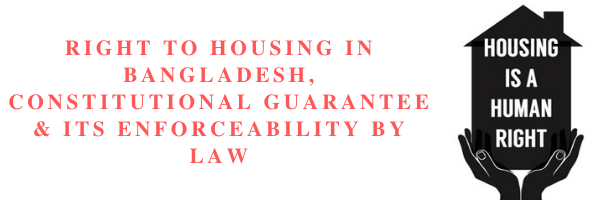Definition of Housing:
According to Legal Dictionary, Housing means a place for the habitation and dwelling of man. According to Cambridge Dictionary, Housing means buildings that people live in, or the providing of places for people to live. In general sense, we can say that housing is nothing but a shelter where people can live. Housing is a fundamental human right. Article 25 of the Universal Declaration of Human Rights recognizes right to housing as part of the right to an adequate part of the living.
Constitutional Guarantee of the Right to Housing:
We know that right to housing is a fundamental human right. It is
guaranteed by the supreme law of our country. It is a fundamental principle of
state policy guaranteed by The Constitution of The Peoples Republic of
Bangladesh. According to Article 15 (a) of The Constitution, It shall be a
fundamental responsibility of the State to attain, through planned economic
growth, a constant increase of productive forces and a steady improvement in
the material and cultural standard of living of the people, with a view to
securing to its citizens, the provision of the basic necessities of life,
including food, clothing, shelter,
education and medical care.
Is Right to Housing is Enforceable by Law?
We know that, right to housing is guaranteed by The Constitution of
our country. But as like other rights, such as, right to equality, right to
personal life and liberty, right to protection of law, right to housing is not
enforceable by law if it is violated by any reasons because it is in the part
of fundamental principles of State policy. It is only enforceable if the
Government of Bangladesh developed its economy in an apparent position.
According to the case of Kudrat-E-Elahi
Panir Vs Bangladesh, fundamental principles of state policy is not law and
that’s why is not enforceable by law.
Case Law Related to the Right to Housing:
1)
BLAST and
others vs. Bangladesh and others [‘Cox’s Bazar Eviction’ Case]:
Fact: BLAST, along with three
inhabitants of the Baharchara and Stadiumpara area challenged a circular issued
by the Deputy Commissioner, Cox’s Bazar and published in local and national
dailies, dated on 15.05.1999, inviting sale of the khas land under Cox’s Bazaar
and Chakoria municipal area. The petitioners, along with several thousand
others, had been in possession of the area for thirty to forty years by duly
paying electricity bills and taxes. The circumstances were properly inquired
into by the Tahsilder, the Assistant Commissioner Land, the Thana Nirbahi
Officer and the Deputy Commissioner, and after due inquiry a recommendation for
lease was made in favor of the petitioners. Pending recommendation, the
impugned circular was issued and the petitioners made several representations
for its withdrawal.
Argument: The petitioners argued that
the circular inviting sale of khas land was a violation of their right to life,
including the right to shelter and the right to property guaranteed by Articles
31, 32 and 42 of the Constitution, read with Article 15. The circular was also
in violation of the rules of the Non-Agricultural Khas Land Management Policy,
1995, which provided for preferential allotment in favour of landless people.
The petition also referred to the state’s obligations under the National
Housing Policy, 1999 and international treaties.
Judgement: The
High Court issued a Rule Nisi on 24.05.1999 on the respondents to show-cause
why a Rule shall not be issued to grant lease in favor of the petitioners in
respect of the khas land in their possession and the Court passed an order of
status quo, which was later extended till disposal of the Rule.
2)
BLAST and
another vs. Bangladesh and others [‘Jhilpara Slum Eviction’ Case]:
Fact: BLAST,
along with residents of Jhilpara Slum, filed a writ petition in the High Court challenging
a notice issued by the Executive Magistrate directing the police to evict
approximately 2,000 inhabitants of Jhilpara Slum, Shahli Thana, Dhaka and to
vacate the slum area on plea of illegal occupation.
Argument: The petitioners claimed that
forced eviction of slum dwellers, without prior rehabilitation or resettlement,
constitutes a violation of the right to life, including the right to shelter,
guaranteed by Articles 31 and 32 of the Constitution, read with Article 15.
Judgement: The High Court stayed the
operation of the notice and issued a Rule Nisi on the respondents directing
them to show cause as to why the threat of eviction without providing for
alternative rehabilitation should not be declared to be without lawful
authority and unconstitutional being in violation of the fundamental rights of
the slum dwellers to life and to be treated in accordance with law.

.png)




.gif)
.gif)

.png)
.gif)



0 Comments